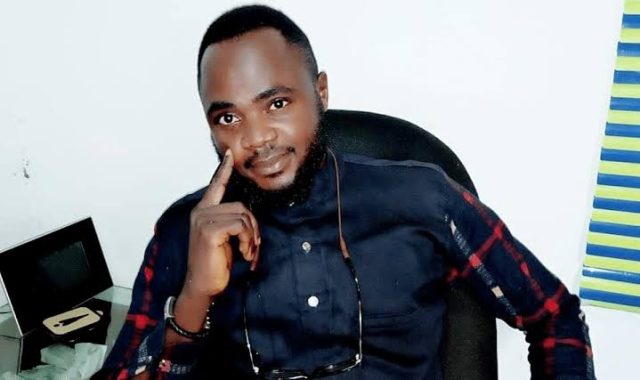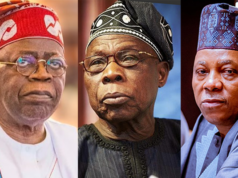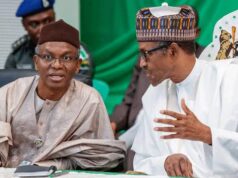To follow Prof. Okey Ndibe on his powerful weekly exposés and other interesting political and entertainment news from Nigeria, click HERE to subscribe to the Life and Times newsletter…
 Here are some of the words with which Steve Kefas sums himself up on Twitter: “accidental journalist; human rights defender; ex-Kaduna political prisoner for 162 days; now living in exile.”
Here are some of the words with which Steve Kefas sums himself up on Twitter: “accidental journalist; human rights defender; ex-Kaduna political prisoner for 162 days; now living in exile.”
Of course, there’s more, a lot more, to Kefas’s life. Yet, his carefully chosen words capture a critical dimension of his public life – on the one hand, his stout defense of the human rights of his besieged people, and, on the other, the considerable personal cost he has incurred for that commitment.
We invited Kefas to our podcast, “Offside Musings,” to tell the story of his odyssey. An eloquent and intrepid guest, he buttressed the way in which, with little or no design on his part, he was drawn into the cauldron of an onslaught against a bunch of communities inhabiting the southern part of Kaduna State.
Kefas’s ordeal is a reflection and microcosm – albeit a much milder form – of the grim fate that’s befallen much of the geographic area known as the middle belt. On graduating from a polytechnic, he had planned to settle down to a quiet life, eking out a living from some job. But his desire for a quiescent existence was not to be. It was upended by the incessant gruesome attacks that targeted his and other minority ethnic groups in southern Kaduna and beyond.
Kefas was struck by the pattern, and certain other features, of these acts of terror. Fulani herdsmen perpetrated the attacks, their victims predominantly Christian. They came armed with highly sophisticated weapons, often superior to armory available to Nigerian soldiers. There was strong evidence that some of the bandits were not Nigerian, but nomads who had slipped in from one neighboring country or another. In effect, foreign bandits were violating Nigeria’s borders to unleash hell on Nigerian citizens.
Each assault amounted to an orgy of rape, plunder and near-extermination. Each resulted in the wholesale sacking of a community. Serious injuries were often inflicted on survivors of these vicious sieges. Without exception, the “lucky” ones – including children, women and infirm elders – faced mental trauma and psychological devastation.
The options for survivors are, by definition, rather dismal. Some would flee to far-flung places, there to begin anew the impossible task of reassembling their shattered lives. Others would shuffle off to decrepit refugee camps established for internally displaced persons. In these camps, where food and water are hard to come by and toilets as well as other basic facilities are often absent, the conditions can be qualitatively no better than animals’ burrows or warrens.
For Kefas, there were several other curiosities. After each homicidal invasion, the triumphant assailants took total possession of land they had soaked with the displaced owners’ blood. Nobody in government, in the country’s law enforcement apparatus or within the armed forces, seemed bothered by the fact that deadly criminals, some of them foreigners, basked in unfettered enjoyment of stolen land. In particular, the state government, headed by Governor Nasir el-Rufai, showed neither outrage nor an inclination to dislodge and prosecute the rapacious herdsmen.
It fell to Kefas, and a few other citizens of his brave constitution, to document the atrocities. Deploying drones, they obtained heartrending images of terrorized communities. They limned the disheartening stories of brutalized people, folks suddenly uprooted from their land and cast into harsh exilic existence. They got damning photos and videos of the assailants, emboldened and gleeful in their sense of entitlement to other people’s property.
Kefas became adept at the use of social media to curate the searing narrative of ravaged or endangered communities unlucky to be part of a country whose political leaders and government agencies are often allied with murderous criminals.
He was quite effective at exposing the steep human cost of impunity in his embattled part of Nigeria. As a result, he earned the attention, and fury, of the powers-that-be. In May of 2019, plainclothes security agents seized him from his hideout in Port Harcourt, the capital of Rivers State, and transported to Kaduna. He would spend more than 160 days in detention. Prosecutors, who never had the spine to charge a single herdsman for manifold horrific crimes, accused him of using social media to defame Governor el-Rufai and a local government chairman. Kefas had rightly flayed the local government chairman for insensibly throwing an obscene party while a community under his charge was in the throes of mourning following a familiar horrendous terror attack.
Detention did not break Kefas. In a way, it empowered him. “They sent me to the prison to punish me,” he told my podcast co-host, Emeka Onyeagwa, and me, “but I went there to learn.” Part of what he learned was the absolute necessity to stay the course, to continue his inescapable work.
In the aftermath of his detention, the threats against Kefas increased in number and intensity. In the end, he fled to a different country, as an exile. But he continues to fight on. He works with collaborators within Nigeria to sustain the mission of alerting the world to the gratuitous violence that is common fare for a growing number of communities.
Predictably, his vision has hardened. “It’s like we have two societies,” he said as he weighed the question of whether Nigeria remains viable as one fused entity. He added: “Light and darkness cannot coexist.”
It is up to those who allow injustice to flourish in the Nigerian space, those who sponsor terrorists, plunderers and killers, those who fertilize criminality to prove him wrong. If they don’t, Nigeria as an idea is doomed. It’s just a matter of time.
Okechukwu Ndibe, better known as Okey Ndibe, (born 1960) an acclaimed Nigerian novelist, political columnist and essayist was born in Yola, Nigeria. He is the author of Arrows of Rain and Foreign Gods, Inc.
Ndibe has worked as a professor at several colleges, including Connecticut College, Bard College at Simon’s Rock, Trinity College in Hartford, Connecticut, and Brown University.
We are honored that he brings his sharp intellectual depth and years of political activism to write for Life and Times.







